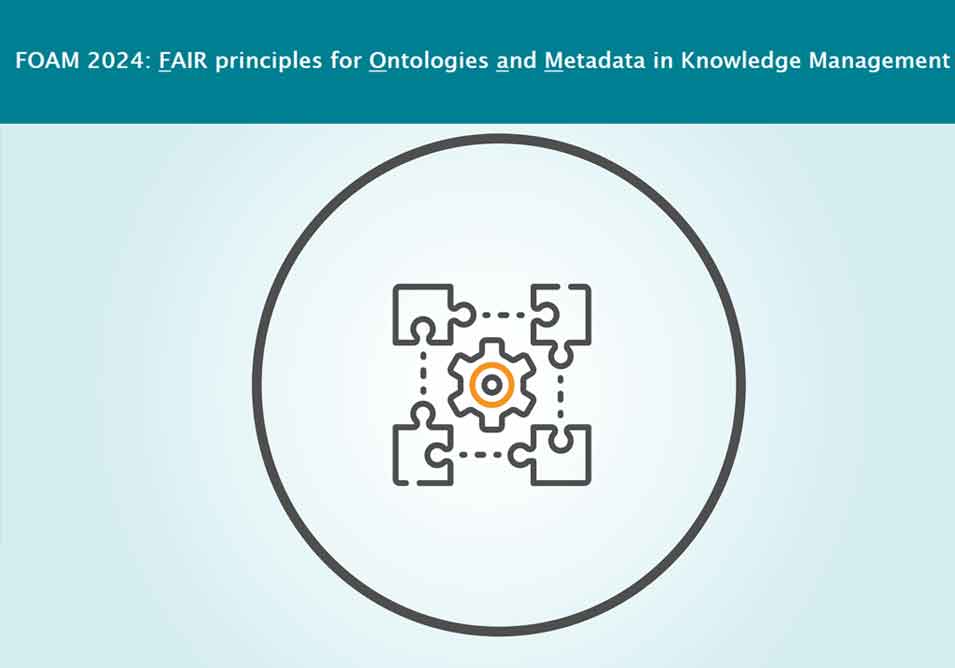FOAM is a new workshop merging the Workshop on Ontologies for FAIR and FAIR Ontologies (Onto4FAIR), the Conceptual Modeling, Ontologies and Metadata Management for Findable, Accessible, Interoperable and Reusable (FAIR) Data (CMOMM4FAIR) and the FAIR Ontology Harmonization and TRUST Data Interoperability Workshop (FOHTI).
The main objectives of this workshop are:
- to bring together new methods for enabling FAIR research outputs (data, software, workflows, ontologies, mappings, etc.) through ontologies and vocabularies
- discuss techniques, metrics and guidelines to improve the FAIRness of ontologies and vocabularies
- to share experiences, identify new challenges and opportunities applying FAIR for different communities
Topics of interest
Making the resources produced by researchers fully reusable and understandable requires complex efforts. To address these issues, the Findable, Accessible, Interoperable and Reusable (FAIR) principles have been developed to provide guidance on making resources more reusable and interoperable. These principles have gained increasing attention in a number of different domains and applications. On the one hand, a key aspect is the ability to describe resources correctly and semantically, in particular using ontologies. On the other hand, ontologies themselves have to comply with the FAIR principles.
The workshop aims to bring together leaders from academia, industry and user institutions to discuss the adoption of the FAIR principles and share real-world requirements, challenges and experiences in their respective domains. In addition, we aim to explore how the FAIR principles are supported by the use of ontologies that are ideally FAIR themselves, and to discuss the challenges and perspectives in adopting the FAIR principles.
The topics of interest include, but are not limited to, the following:
- ontologies, schemas and vocabularies for FAIR data and metadata;
- domain and cross-domain ontologies for FAIR research outputs (data, software, mappings, workflows, ontologies, ML models, etc.);
- techniques, methods and tools to increase the FAIRness of vocabularies and ontologies;
- FAIR ontology harmonisation, mapping, alignment, merging and modularisation;
- best practices on modeling FAIR research outputs;
- semantic descriptions of FAIR digital objects;
- challenges in FAIR research output management and modeling;
- novel applications of the FAIR principles, FAIRification process and use cases;
- metrics for FAIRness assessment;
- provenance in FAIR environments;
- FAIR principles and open science;
- FAIR principles and linked open data;
- Application of the FAIR principles in scientific communities (life science, digital humanities, health, smart cities, etc.)
Submissions
Submissions can be made in the following categories:
- Full papers (10 - 12 pages, including references)
- Short papers (6 - 9 pages, including references)
- Posters (up to 5 pages, including references)
FAIR-IMPACT at the event
FAIR-IMPACT had 2 papers accepted at the conference.
- Ontology Engineering and the FAIR principles: A Gap Analysis. María Poveda-Villalón, Daniel Garijo, Alejandra Gonzalez- Beltran, Clement Jonquet and Yann le Franc.
- Moving towards FAIR mappings and crosswalks. Jana Martínková, Nick Juty, Alejandra Gonzalez Beltran, Carole Goble and Yann Le Franc.
Official event page: https://onto4fair.github.io/foam/
